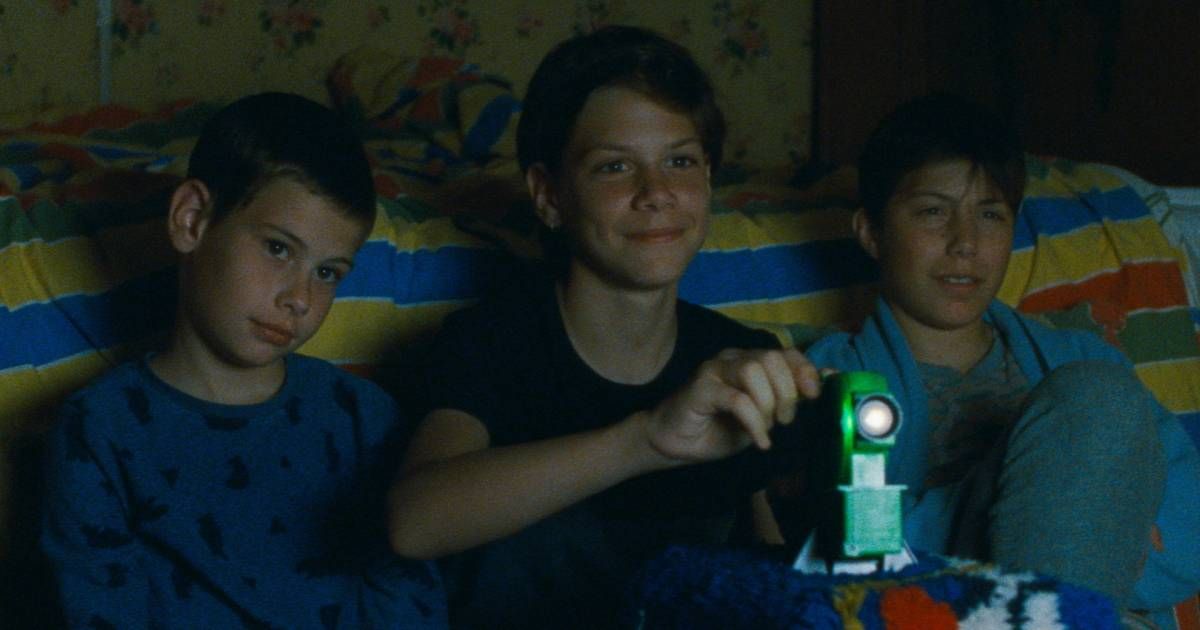Kids can be difficult, but so can our parents and guardians. Such notions are explored with an artistic hand in David Depesseville's debut narrative feature, which will be released Friday, Sep. 1. Astrakan — whose mystery of a title is finally revealed in the film's groundbreaking third act — is French Impressionism at its finest, chronicling hard-hitting, slow-burn sequences of a young orphan named Samuel (Mirko Giannini). It's an utterly realistic portrayal of youth in revolt that sheds light on the work of Francois Truffaut (The 400 Blows) and could even fit well into a Wes Anderson film — I'm looking at you, Moonrise Kingdom.
Gripping French cinema is often hard to refute, even if this isn't exactly a commercial-grade project. But sometimes, less is more — and here, the simple yet lush 16mm film component allows Astrakan to really shine.
A Gripping Look at Youth in Revolt
First, a word about French Impressionism, a landmark movement most commonly associated with painting, but that also includes early French cinema of the 1920s. Explicitly French and aesthetically innovative, the often non-linear films from directors like Louis Delluc and Abel Gance depicted dreams, a protagonist's point of view, and narratives that don't rely on traditional morals and motivations.
In Astrakan, we're rooting for Samuel, a young orphan who is sent to live with his foster parents, Marie (Jehnny Beth, superb) and Clement (Bastien Bouillon, also fantastic in another recent French film, The Night of the 12th). It's a tough coming-of-age for Samuel, as he battles his own demons while slowly learning of the sort of skeletons in his guardians' closet. We quickly learn that the couple is struggling financially, and are barely able to fund the talented Samuel's gymnastics membership at the local rec center. Clement also beats Samuel physically, even in instances where he promises in advance that he won't.
It's easy, therefore, to cheer for Samuel despite his troublemaking ways. He grows romantically attached to a lovely classmate named Hélène (Lorine Delin). Both Giannini and Delin undoubtedly have bright futures ahead of them. Their performances and on-screen chemistry are magnetic. But let's not forget Samuel is a "bad boy" of sorts. Later in the film, for example, we witness him purposefully jump out in front of a moving vehicle.
At another point, he climbs a dangerous tree he shouldn't be getting near, and he plummets — though he's not seriously hurt. In a seeming nod to Harold and Maude, he even fakes his own death for a mere laugh, dousing himself in ketchup right as Marie gets home one day. What does she do? Well, for starters, they try to take Samuel to some sort of hypnotherapist, which does nothing. And this is where filmmaker Depesseville weaves in bleak humor and doesn't need to add any sort of dramatic music to try and heighten the comedic effect.
They also take Samuel to church, but he can't help but play with fire, quite literally. Then, Marie and Clement ultimately dump Samuel with their relatives on a nearby farm, where the mysterious Luc (the excellent Théo Costa-Marini) resides. Without giving away too much, his rapport with the much younger Samuel is intriguing, thought-provoking, and even a little ominous. Luc is a scene-stealing side player that's certainly worth tuning in for alone.
Lush 16mm Never Fails
It's important to note, therefore, that the society around Samuel isn't exactly playing by the rules either. In addition to the aforementioned physical abuse Samuel endures at home, he also gets beat up by a gang of young bullies at the local movie theater. Additionally, Samuel's class goes on a skiing field trip, where the Olympic pro athlete slated to speak to and inspire the kids is later spotted getting intimate with their teacher. Of course, it's Samuel who stumbles upon this discovery. It's clear, then, that this sort of society doesn't invalidate Samuel's rebellious nature, so we can't help but root for him after each self-inflicted setback.
And all this is shot on 16mm film, adding a lush, lived-in look that heightens the raw, authentic, but sometimes dreamy feel of this impressionist feature. It all comes to a head in the film's final act, as a musical number by Bach takes over the soundtrack while the film concludes in an artistic, montage-like expression. Foster mom Marie, who has been struggling to raise Samuel the whole story, stumbles upon a small lamb during a family camping trip — and it's here that the film's title comes back into view. It's a tender moment as a naked Marie takes in the small furry friend, while Samuel seems to have found his way independently nearby.
Or maybe not entirely, but we don't exactly need to see a happy ending for the young lad. Thanks to Depesseville's confident direction, somehow we know Samuel is going to be okay.
From Altered Innocence, Astrakan opens theatrically and lands on VOD Friday, Sep. 1.

Comments
Post a Comment